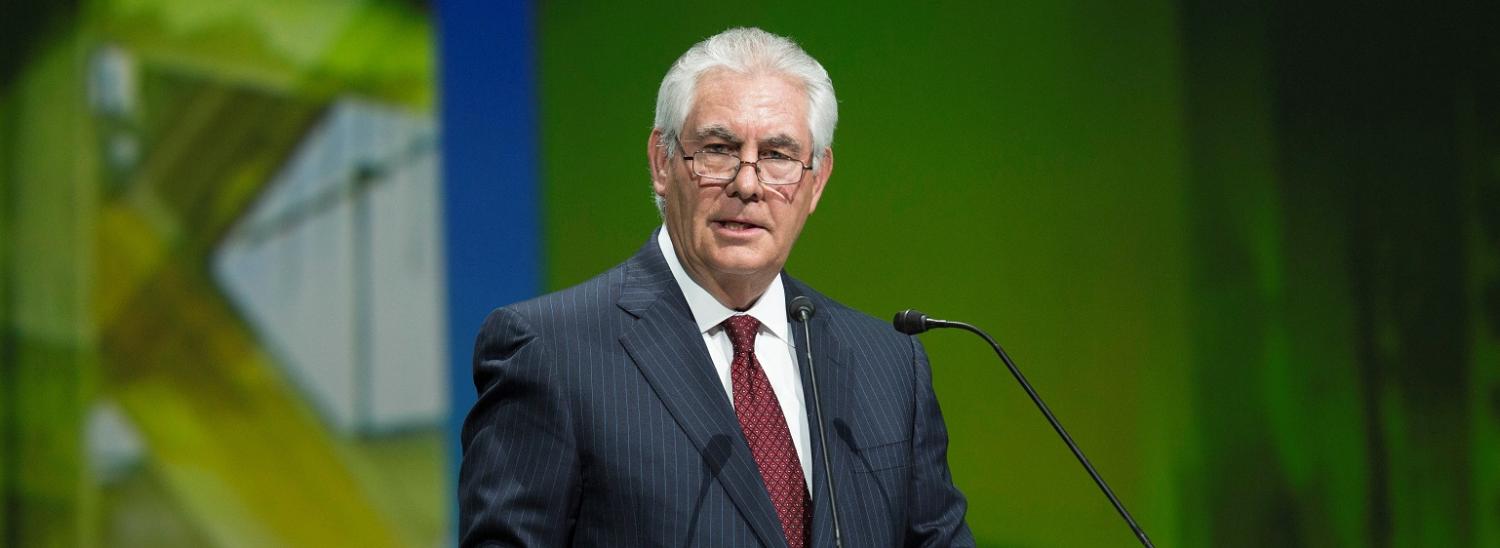Rex Tillerson, Secretary of State designate, was not so much a dark horse as a late finisher for the most prestigious job in Washington apart from the presidency itself.
President-elect Donald Trump seems to have had lingering reservations about other contenders including early frontrunners, former New York mayor Rudy Giuliani and former Republican presidential candidate, Mitt Romney, otherwise he would not have chosen to cast the net wider.
While questions have been raised about Tillerson’s lack of governmental exposure, his experience as head of America’s biggest company would seem on the face of it to be reasonable training for America’s leading diplomat. The president of Exxon Mobil would have fleshed out his experience as part business manager, part corporate relations head, and part diplomat negotiating complex deals with foreign governments. That experience should stand Tillerson in reasonable stead for dealing with an international environment that has scarcely been more challenging.
Where his lack of direct Washington experience may prove to be a handicap would lie in managing complex relationships with the presidency itself and with various government agencies in what is certain to be a contentious landscape. Whatever forecasts might be made about a Trump presidency it will not be conventional. Working within an unconventional environment will be challenging for someone used to a well-disciplined corporate structure. Tillerson’s diplomatic skills are likely to be tested as much within a government in which strong personalities – and prejudices – will abound, as in the world of high wire diplomacy itself.
When his name emerged as leading candidate for Secretary of State among concerns raised was that a businessman who has spent his life in the fossil fuel industry would be compromised in dealing with the vexed climate change issue. But in his public remarks Tillerson could not be regarded as a climate change sceptic, nor someone who would necessarily be out of step with a global consensus on the need to mitigate risks. Indeed, Exxon under his leadership articulated its support for the agreement reached in Paris earlier this year aimed at curbing global emissions.
How this position squares with Trump’s disavowal of both the Paris agreement and climate change concerns more generally enunciated frequently on the campaign trail remains to be seen. Tillerson has described the threat of climate change as 'real' and 'serious'. The climate change issue may well provide an early indication of the sort of leeway Tillerson will enjoy under a Trump-led White House. Similarly, his position on the Iran nuclear agreement issue is potentially at odds with Trump’s largely negative views. It would be hard to imagine a pragmatic former Exxon executive wanting to tear up such a deal in lieu of a reasonable alternative.
Most attention since Tillerson emerged as favorite for State has focused on his relationship with Russian President Vladimir Putin. This grew out of his extensive contacts with Putin over a number of years. These flowed from Exxon Mobil’s agreement to drill for oil in the Russian portion of the Arctic circle. That agreement has been on ice since sanctions were imposed on Russia over its annexation of Crimea in 2014.
Tillerson’s Russian connections will be subject to extensive scrutiny during Senate hearings, but barring something untoward would be unlikely to derail his nomination. His views on relations with China, a US pivot to Asia and other big picture issues will also be explored in his confirmation hearings providing a clearer sense of his priorities. But there is nothing in his record to suggest the 64-year-old lifelong Exxon employee whose roots are firmly in his native Texas is anything but an internationalist and free trader.
How this squares with the president elect’s protectionist views will be another potential test of their relationship. In one respect Tillerson will be a unique nominee. In contrast to all his post-war predecessors he has no direct experience of Washington’s internal machinations beyond his interactions with government on issues affecting an energy behemoth.
He has been compared with George Shultz who served as Secretary of State under Ronald Reagan after a stint as president of the engineering giant, Bechtel, but Shultz had extensive Washington experience, including roles as Treasury Secretary and Labor Secretary. He had taught economics as a professor as the Massachusetts Institute of Technology. Shultz was an academic, a public servant and latterly a businessman; Tillerson’s experience is much narrower. Washington and America’s allies will reserve judgement.

